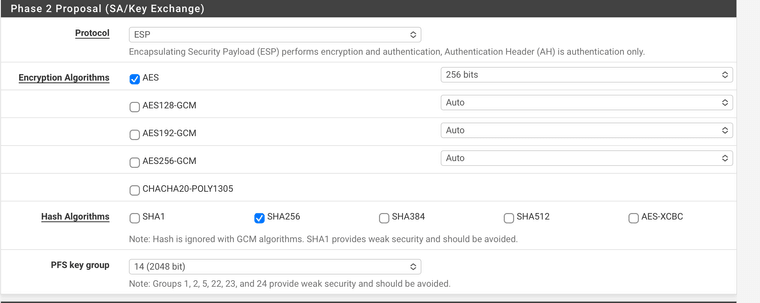Windows 11 IPSec ESP no acceptable proposal found
-
We are trying to connect using a configuration that works perfectly with Windows 10 as a client, but with Windows 11 we get this:
Apr 22 17:22:26 charon 12318 01[IKE] <con-mobile|1602> no acceptable proposal found Apr 22 17:22:26 charon 12318 01[CFG] <con-mobile|1602> configured proposals: ESP:AES_GCM_16_256/MODP_2048/NO_EXT_SEQ, ESP:AES_GCM_12_256/MODP_2048/NO_EXT_SEQ, ESP:AES_GCM_8_256/MODP_2048/NO_EXT_SEQ, ESP:AES_CBC_256/HMAC_SHA2_256_128/MODP_2048/NO_EXT_SEQ, ESP:AES_CBC_192/HMAC_SHA2_256_128/MODP_2048/NO_EXT_SEQ, ESP:AES_CBC_128/HMAC_SHA2_256_128/MODP_2048/NO_EXT_SEQ, ESP:AES_GCM_16_192/MODP_2048/NO_EXT_SEQ, ESP:AES_GCM_12_192/MODP_2048/NO_EXT_SEQ, ESP:AES_GCM_8_192/MODP_2048/NO_EXT_SEQ, ESP:AES_GCM_16_128/MODP_2048/NO_EXT_SEQ, ESP:AES_GCM_12_128/MODP_2048/NO_EXT_SEQ, ESP:AES_GCM_8_128/MODP_2048/NO_EXT_SEQ, ESP:AES_CBC_256/HMAC_SHA2_384_192/MODP_2048/NO_EXT_SEQ, ESP:AES_CBC_256/HMAC_SHA2_512_256/MODP_2048/NO_EXT_SEQ, ESP:AES_CBC_256/AES_XCBC_96/MODP_2048/NO_EXT_SEQ, ESP:AES_CBC_192/HMAC_SHA2_384_192/MODP_2048/NO_EXT_SEQ, ESP:AES_CBC_192/HMAC_SHA2_512_256/MODP_2048/NO_EXT_SEQ, ESP:AES_CBC_192/AES_XCBC_96/MODP_2048/NO_EXT_SEQ, ESP:AES_CBC_128/HMAC_SHA2_384_192/MODP_2048/NO_EXT_SEQ, ESP:AES_CBC_128/HMAC_SHA2_512_256/MODP_2048/NO_EXT_SEQ, ESP:AES_CBC_128/AES_XCBC_96/MODP_2048/NO_EXT_SEQ Apr 22 17:22:26 charon 12318 01[CFG] <con-mobile|1602> received proposals: ESP:AES_CBC_256/AES_256_GMAC/NO_EXT_SEQ Apr 22 17:22:26 charon 12318 01[CFG] <con-mobile|1602> no acceptable ENCRYPTION_ALGORITHM found Apr 22 17:22:26 charon 12318 01[CFG] <con-mobile|1602> selecting proposal:I have enabled all available phase 2 ESP options to make sure that I didn't just select the wrong one, but it's clear that Windows 11 requests something Windows 10 doesn't.
Windows 10 does this:
Apr 22 17:02:36 charon 12318 15[CFG] <con-mobile|1598> selected proposal: ESP:AES_GCM_16_256/NO_EXT_SEQ Apr 22 17:02:36 charon 12318 15[CFG] <con-mobile|1598> configured proposals: ESP:AES_GCM_16_256/MODP_2048/NO_EXT_SEQ, ESP:AES_GCM_12_256/MODP_2048/NO_EXT_SEQ, ESP:AES_GCM_8_256/MODP_2048/NO_EXT_SEQ, ESP:AES_CBC_256/HMAC_SHA2_256_128/MODP_2048/NO_EXT_SEQ, ESP:AES_CBC_192/HMAC_SHA2_256_128/MODP_2048/NO_EXT_SEQ, ESP:AES_CBC_128/HMAC_SHA2_256_128/MODP_2048/NO_EXT_SEQ Apr 22 17:02:36 charon 12318 15[CFG] <con-mobile|1598> received proposals: ESP:AES_GCM_16_256/NO_EXT_SEQ Apr 22 17:02:36 charon 12318 15[CFG] <con-mobile|1598> proposal matchesSo Windows 11 wants
ESP:AES_CBC_256/AES_256_GMAC/NO_EXT_SEQ
but with the same client config Windows 10 wants
ESP:AES_GCM_16_256/NO_EXT_SEQAny ideas on how to fix this?
-
Use The IPsec export function on Plus, or if you're on CE, use powershell on Windows to set the exact parameters you want on both to match.
https://learn.microsoft.com/en-us/powershell/module/vpnclient/?view=windowsserver2022-ps
We don't have any specific examples of that in the pfSense docs, but there are plenty of examples around the Internet (and even some in the TNSR docs)
-
@jimp I have indeed used powershell to create the tunnel in the first instance, since without it only an insecure tunnel is possible.
According to Microsoft's documentation Windows 10 offers:
Phase 1 encryption Type: EncryptionMethod Accepted values: DES, DES3, AES128, AES192, AES256, GCMAES128, GCMAES256 Phase 2 encryption Type: CipherTransformConstants Accepted values: DES, DES3, AES128, AES192, AES256, GCMAES128, GCMAES192, GCMAES256, NoneWindows 11 offers:
Phase 1 encryption Type: EncryptionMethod Accepted values: DES, DES3, AES128, AES192, AES256, GCMAES128, GCMAES256 Phase 2 encryption Type: CipherTransformConstants Accepted values: DES, DES3, AES128, AES192, AES256, GCMAES128, GCMAES192, GCMAES256, NoneSo the only option one has to get both Win 10 and 11 to IPSec to work is to use a method that is supported by both and pfSense. Since GCM used hardware encryption GCMAES128 seems like a good choice or CGMAES256.
The Powershell command we used to create the tunnel on both Windows 10 and 11 is:
Set-VpnConnectionIPsecConfiguration ` -ConnectionName "IPSec-cloud" ` -AuthenticationTransformConstants GCMAES256 ` -CipherTransformConstants AES256 ` -EncryptionMethod GCMAES256 ` -IntegrityCheckMethod SHA256 ` -DHGroup Group14 ` -PfsGroup PFS2048 ` -PassThruHowever, despite explicitly setting Windows 11 to use GCMAES256, it presents itself to pfSense as AES_CBC_256/AES_256_GMAC, neither of which are available for selection in pfSense.
So it's not simply a matter of picking the matching encryption. AES-CBC is not available in pfSense at all. What GMAC is I don't know.
I'm stuck now.... :-(
-
Has been any resolution of this? Surely I'm not only person in the world trying to connect a Windows 11 IPSec client to pfSense CE?
-
@lifeboy I have no issues connecting to pfSense using the built-in VPN in Win11.
I just use these settings:

And here is the powershell to create the VPN:
Add-VpnConnection -Name "XXXXX" -ServerAddress host.domain.dk -TunnelType "Ikev2"
Set-VpnConnectionIPsecConfiguration -ConnectionName "XXXXX" -AuthenticationTransformConstants "SHA256128" -CipherTransformConstants "AES256" -DHGroup "Group14" -EncryptionMethod "AES256" -IntegrityCheckMethod "SHA256" -PfsGroup "PFS2048" -Force -
@keyser thanks for that! I'll have to check with a client that has a Windows 11 machine (I don't have one).
Which one of the these translates to SHA256128 in IPSec Encryption on pfSense?

-
@lifeboy When editing the Phase one and Phase 2 settings, only one encryption settings is enabled in both:
AES256 and using SHA256 with DH14:
